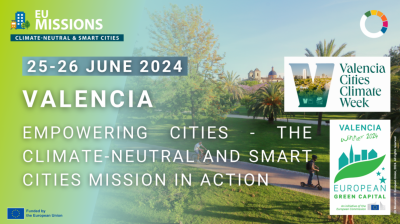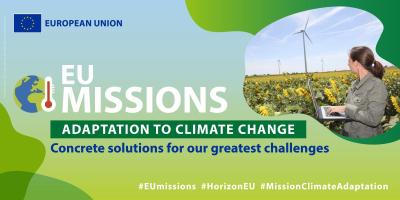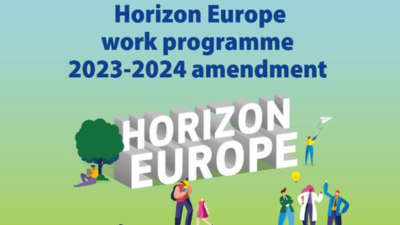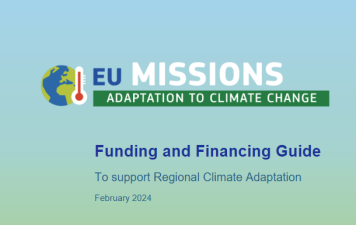A Mission on Adaptation to Climate Change
One of the five EU Missions is the Mission on Adaptation to Climate Change, which will support EU regions, cities and local authorities in their efforts to build climate resilience against the impacts of climate change.
The Implementation Plan published in September 2021 outlines the main goal of the Mission, which is to support at least 150 European regions and communities in becoming climate resilient by 2030. In doing so, the Mission will engage local actors, notably in climate-vulnerable regions, as well as citizens by funding projects facilitating and requiring their involvement. Considering that the level of preparedness for climate impacts varies substantially between regions in Europe, this R&I support will be provided in different ways.
Specific objective 1: Preparing and planning for climate resilience to provide general support to European regions and communities to better understand, prepare for and manage climate risks and opportunities.
Specific objective 2: Accelerating transformations to climate resilience to work with at least 150 regions and communities to accelerate their transformation to a climate resilient future, supporting them in the co-creation of innovation pathways and the testing of solutions.
Specific objective 3: Demonstrating systemic transformations to climate resilience to deliver at least 75 large-scale demonstrations of systemic transformations to climate resilience across European regions and communities.

ERRIN input to the Adaptation Mission
2020
ERRIN took early on an active role in shaping the Mission on Adaptation to Climate Change and is closely following the implementation of the Mission. The first input document developed by ERRIN and its members was followed up with an exchange with the former Mission Board Chair, Connie Hedegaard, during an ERRIN webinar held in July 2020. In October 2020, ERRIN members participated in a co-creation event held by the European Commission, with an aim to further design the selection criteria and the involvement of regions and communities in the Mission.
2021
As a follow-up on the session organised in autumn 2020, ERRIN organised another session together with the Mission Secretariat and Climate KIC in March 2021. In September 2021, ERRIN held an Energy & Climate Change Working Group session focusing on how regions can take an active role in the implementation of the Mission.
2022
In February 2022, ERRIN organised a joint sounding board meeting with the European Commission to exchange on the progress of regions towards climate resilience and priority actions for the Mission in the coming years. This was followed up with an ERRIN input on the Mission Charter in March 2022, which lays out a set of commitments for the regions and communities signing the Charter and committing to the Mission and its objectives.
In May 2022, ERRIN published its key messages for the Horizon Europe Missions Work Programme 2023-2024, were several recommendations concerning the future funding for the Adaptation Mission were proposed, such as the need for a quadruple helix approach, the need for further calls providing cascade funding, and the need for an inclusive and interdisciplinary approach. In June 2022, ERRIN became a Friend of the Mission, alongside over 50 network members who became signatories of the Mission Charter. During the European Research and Innovation Days in October 2022, a further 47 network members were announced as having signed the Mission Charter, resulting in 100 ERRIN associated cities and regions being signatories.
2023
In 2023, ERRIN launched its Adaptation Task Force which will continue the policy dialogue with the Mission Secretariat and follow the implementation of the Mission in ERRIN regions. Two ERRIN projects supporting the implementation of the Mission kicked off in January 2023 - Pathways2Resilience and RESIST.
ERRIN provided input to the implementation of the Adaptation Mission in its input paper to the consultation on the Horizon programmes 2014-2027. In its input paper, ERRIN highlighted the important role of the Mission in placing adaptation to climate change higher up on the political agenda at the local and regional level and the importance of the Community of Practice in enabling matchmaking, knowledge exchange and peer-learning between regions. Key areas to further strengthen in the Mission include the lack of a clear process for regions to engage in the Mission and increased access to funding to support the implementation of the Mission.
In March 2023, the final list of Mission Charter signatories was announced, amounting to 308 signatories in total. More than 130 Charter signatories are associated with ERRIN member cities and regions.
Funding Opportunities
Pathways2Resilience: Funding to develop resilience pathways
The Pathways2Resilience project's first call for applicants is open between 22 November 2023 and 6 May 2024. Through this call, 40 regions and communities will be selected to receive a sub-grant of up to €210 000 for a project period of 18 months to support activities related to the development of local and regional resilience pathways.





